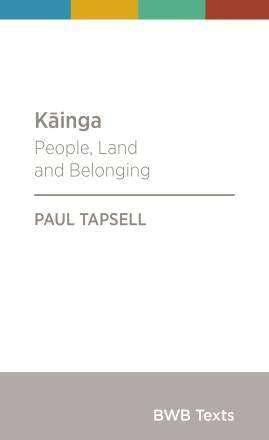Kainga : People Land and Belonging : BWB Texts
- Unit price
- / per
-
Author:Paul Tapsell
-
ISBN:9781988587585
-
Publication Date:November 2021
-
Edition:1
-
Pages:160
-
Binding:Paperback
-
Publisher:Bridget Williams Books
-
Country of Publication:New Zealand


A Back Order button means that we don’t have the book in stock at our store. It may already be on order – or we can order it for you from a publisher or distributor at no additional cost.
As we source items from around the globe, a back-order can take anywhere from 5 days to several weeks to arrive, depending on the title.
To check how long this might take, you’re welcome to contact us and we can provide an ETA or any other information you need. We recommend checking the timeframe before committing to an online order.
Kainga : People Land and Belonging : BWB Texts
- Unit price
- / per
-
Author:Paul Tapsell
-
ISBN:9781988587585
-
Publication Date:November 2021
-
Edition:1
-
Pages:160
-
Binding:Paperback
-
Publisher:Bridget Williams Books
-
Country of Publication:New Zealand
Description
Through his own experience and the stories of his tipuna, Paul Tapsell (Te Arawa, Ngati Raukawa) charts the destruction caused by the alienation of his people from their kainga and whenua, and from each other.
Colonialism and capitalism, extraction and exploitation, have diminished Papatuanuku to the point of extinction and the Earth mother now demands that humanity humble itself to restore balance in our relationship with the natural world.
This book calls for action from the Crown to recognise, protect and restore the sovereignty of Kainga communities as promised in Te Tiriti. We must find a way for Pakeha farmers and Maori kainga to work together in true partnership. The application of matauranga Maori is vital if New Zealand is to have any hope of surviving the climate crisis before us.
Adding product to your cart
You may also like
A Back Order button means that we don’t have the book in stock at our store. It may already be on order – or we can order it for you from a publisher or distributor at no additional cost.
As we source items from around the globe, a back-order can take anywhere from 5 days to several weeks to arrive, depending on the title.
To check how long this might take, you’re welcome to contact us and we can provide an ETA or any other information you need. We recommend checking the timeframe before committing to an online order.
You may also like
You may also like
-
Through his own experience and the stories of his tipuna, Paul Tapsell (Te Arawa, Ngati Raukawa) charts the destruction caused by the alienation of his people from their kainga and whenua, and from each other.
Colonialism and capitalism, extraction and exploitation, have diminished Papatuanuku to the point of extinction and the Earth mother now demands that humanity humble itself to restore balance in our relationship with the natural world.
This book calls for action from the Crown to recognise, protect and restore the sovereignty of Kainga communities as promised in Te Tiriti. We must find a way for Pakeha farmers and Maori kainga to work together in true partnership. The application of matauranga Maori is vital if New Zealand is to have any hope of surviving the climate crisis before us.
-
-
Author: Paul TapsellISBN: 9781988587585Publication Date: November 2021Edition: 1Pages: 160Binding: PaperbackPublisher: Bridget Williams BooksCountry of Publication: New Zealand
Through his own experience and the stories of his tipuna, Paul Tapsell (Te Arawa, Ngati Raukawa) charts the destruction caused by the alienation of his people from their kainga and whenua, and from each other.
Colonialism and capitalism, extraction and exploitation, have diminished Papatuanuku to the point of extinction and the Earth mother now demands that humanity humble itself to restore balance in our relationship with the natural world.
This book calls for action from the Crown to recognise, protect and restore the sovereignty of Kainga communities as promised in Te Tiriti. We must find a way for Pakeha farmers and Maori kainga to work together in true partnership. The application of matauranga Maori is vital if New Zealand is to have any hope of surviving the climate crisis before us.
-
Author: Paul TapsellISBN: 9781988587585Publication Date: November 2021Edition: 1Pages: 160Binding: PaperbackPublisher: Bridget Williams BooksCountry of Publication: New Zealand
-



